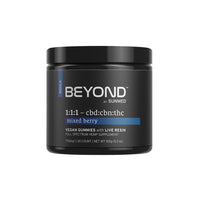Can dogs have CBN?

Medically Reviewed by: Dr. Caley Scott, ND
In recent years, cannabinoids have gained attention for their potential benefits, not just for humans but also for pets. Among the various cannabinoids, CBD (cannabidiol) has become particularly popular for its soothing and tension-relieving effects.
However, as the cannabinoid market continues to expand, other compounds like CBN (cannabinol) are beginning to emerge as potential options for wellness, raising important questions about their safety and efficacy.
One such question that pet owners are increasingly asking is: can dogs have CBN? As dogs are often considered family members, their health and well-being are of utmost importance. Understanding whether CBN is safe for dogs, and whether it offers any benefits, is crucial for those looking to explore alternative treatments for their furry companions.
This article will dive into the world of CBN, looking at what it is, how it interacts with a dog’s body, its potential benefits and risks, and the current state of the market for CBN pet products.
By the end, pet owners will have a clearer understanding of whether CBN might be a viable option for their dogs and what precautions they should take if considering its use.
What is CBN?
Cannabinol, commonly known as CBN, is one of the many cannabinoids found in the cannabis plant. Unlike CBD and THC, which are more widely recognized, CBN is a lesser-known compound that arises primarily from the degradation of THC. When THC is exposed to air, heat, or light over time, it breaks down and transforms into CBN. This process makes CBN naturally present in older cannabis plants or products that have been stored for a prolonged period.
CBN is often associated with its mild psychoactive effects, though it is much less potent than THC. This means that while CBN can produce a slight feeling of sleep-inducing relaxation, it does not induce the "high" that is typically linked with THC. This characteristic has led to increasing interest in CBN as a potential source of sleep support, as well as a compound with tension-relieving properties.
In humans, CBN has been studied for its potential to help with a range of concerns, including sleep However, research into CBN is still in its early stages, particularly when compared to the extensive studies on CBD and THC. The legal status of CBN also varies by region, as it is closely related to THC, although it is generally less regulated due to its mild effects.
Understanding the basic properties of CBN and how it differs from other cannabinoids is essential before considering its use in dogs. As with any substance, especially those derived from cannabis, the effects on animals can be quite different from those on humans. This brings us to the next critical topic: how CBN interacts with a dog's body, particularly through the endocannabinoid system.
What to know about the endocannabinoid system in dogs
To understand how CBN might affect dogs, it’s essential to first explore the endocannabinoid system (ECS), a complex cell-signaling system present in all mammals, including dogs.
The ECS plays a crucial role in maintaining physiological balance and regulating various functions such as mood, pain sensation, appetite, and immune response. It consists of three main components: endocannabinoids (naturally occurring cannabinoids produced by the body), receptors (primarily CB1 and CB2), and enzymes that synthesize and break down these cannabinoids.
The role of receptors in the ECS
In dogs, the ECS operates similarly to the system in humans, but with some critical differences that make dogs more sensitive to cannabinoids.
The CB1 receptors are primarily found in the brain and central nervous system, while CB2 receptors are more common in the peripheral organs, especially in cells associated with the immune system. When cannabinoids like CBN interact with these receptors, they can influence various physiological processes.
CBN, like other cannabinoids, is thought to interact more selectively to CB2 receptors, which are linked to immune response and tension management. This suggests that CBN could potentially have soothing effects in dogs, similar to those observed in humans. However, because dogs have a higher concentration of CB1 receptors in their brains compared to humans, they can be more susceptible to the psychoactive effects of certain cannabinoids, particularly THC.
While CBN has far less psychoactive potential than THC, this increased sensitivity means that the potential for adverse effects cannot be entirely ruled out.
Cannabinoid metabolism in dogs
Another important consideration is how dogs metabolize cannabinoids. Dogs process these compounds differently from humans, which can result in prolonged effects or heightened sensitivity. This difference in metabolism underscores the importance of cautious serving sizes and careful monitoring when introducing any cannabinoid, including CBN, into a dog's routine.
Understanding the ECS and its role in dogs is crucial for evaluating the potential benefits and risks of CBN for canine health. While the system’s fundamental similarities with the human ECS provide a basis for considering cannabinoids as therapeutic agents for dogs, the unique aspects of canine physiology must be taken into account.
This knowledge sets the stage for exploring whether CBN can offer specific benefits for dogs, particularly in managing concerns like stress, discomfort, and sleep.
What are the potential benefits of CBN for dogs?
As interest in the therapeutic use of cannabinoids for pets grows, CBN has emerged as a compound of potential interest due to its unique properties.
While research on CBN's effects in dogs is still in its infancy, there are several potential benefits that have garnered attention based on its effects in humans and other animals.
Relief from tension
One of the most promising potential benefits of CBN for dogs is its ability to help manage stress and tension. Dogs, like humans, can experience stress due to various factors such as separation, loud noises, or unfamiliar environments.
CBN is believed to have mild calming properties, which could help naturally reduce tension in dogs without the intense sedation often associated with stronger medications.
While more research is needed to confirm its efficacy, anecdotal reports from pet owners suggest that CBN may help alleviate stress in dogs, making it a potential alternative or supplement to CBD.
Discomfort relief
Another area where CBN may prove beneficial for dogs is in relieving discomfort. Discomfort is a common issue in older dogs. CBN, like CBD, has been studied for its potential to reduce discomfort and provide relief.
Its interaction with the CB2 receptors, which are more involved in the immune system and responses to discomfort, suggests that CBN could be effective in alleviating discomfort and improving the quality of life for dogs dealing with discomfort.
Although direct studies on CBN and canine discomfort relief are limited, the compound’s potential to provide relief, observed in other contexts, makes it a promising candidate for further research in this area.
Sleep support for dogs
Dogs, especially as they age, can experience sleep disturbances, including difficulty falling asleep or staying asleep.
CBN has gained attention in human wellness for its potential as a sleep aid, proven in Sunmed's recent clinically study. This property could also be beneficial for dogs with sleep concerns, helping them achieve more restful sleep.
Early research and anecdotal evidence
Although comprehensive scientific studies on CBN's effects on dogs are limited, early research and anecdotal evidence suggest that CBN could offer therapeutic benefits in relieving discomfort, feelings of nervousness, and tension, as well as supporting overall sleep quality.
These potential benefits make CBN a compound worth considering as part of a holistic approach to canine wellness, though it should always be done with caution and professional guidance.
What to know about cannabinoids for pets
The use of cannabinoids in pet care has seen a significant rise in popularity as more pet owners seek natural alternatives to support their pets' well-being. Cannabinoids, such as CBD and CBN, have been studied for their potential to alleviate discomfort, reduce stress, and improve the quality of life in dogs and cats. Recent safety studies have also demonstrated that various cannabinoid formulas are well-tolerated in healthy dogs, highlighting the safety and efficacy of CBD products for canine health.
When it comes to cannabinoid products for pets, quality is of utmost importance. Pets, especially dogs and cats, are more sensitive to cannabinoids than humans, making it crucial that these products are carefully formulated to ensure safety and efficacy.
High-quality cannabinoid products for pets should be derived from organically grown hemp, free from harmful chemicals, and undergo rigorous third-party testing to confirm purity and potency.
Support your dog the Sunmed way
Among the many brands offering cannabinoid products for pets, Sunmed stands out as a leader in the industry. Sunmed's commitment to quality, transparency, and innovation has earned them a reputation for providing some of the best tinctures and chews for dogs and cats available today. Each Sunmed pet formula is formulated by veterinarians with guidance from the national Animal Supplement Council.
Sunmed's USDA-organic pet tinctures and award-winning chews are crafted with the highest standards in mind. We use broad spectrum hemp extract, which means our products contain a range of beneficial cannabinoids and terpenes without the psychoactive effects of THC. This allows pets to experience the potential benefits of cannabinoids without any risk of intoxication.
By choosing Sunmed, pet owners can feel confident that they are providing their furry companions with the best possible support for their health and well-being.
As the market for pet cannabinoid products continues to expand, Sunmed remains at the forefront, setting the standard for quality and effectiveness. Whether you're looking to help your pet manage discomfort, reduce stress, or simply improve their overall quality of life, our CBD pet tinctures and chews offer a trusted solution that you can rely on.
Sources:
Scientific Validation of Cannabidiol for Management of Dog and Cat Diseases | NIH
Safety study of cannabidiol products in healthy dogs | NIH
Pharmacokinetics, efficacy, and safety of cannabidiol in dogs: an update of current knowledge | NIH











